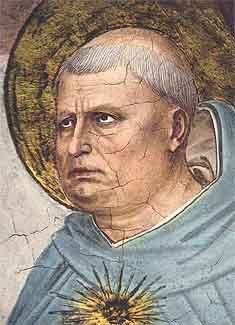On the Origins of New Forms of Life
1.1: On the origin of the word species
(Continued from the previous page)
 St. Thomas Aquinas
St. Thomas Aquinas1225 - 1274
The story of the word species (Greek εἶδος¹) begins with Plato. According to St. Thomas Aquinas (Summa Theologica, ca. 1265-1274 A.D.),
As used by Aristotle, genus (γένος) and species were philosophical categories. A genus was a category and a species was a subcategory of a genus. The two terms were just as often applied to inanimate things as to living ones. For example, it would have been nothing unusual to say "house is a species of the genus building." Aristotle defined a thing by specifying its "τὸ τί ἦν εἶναι," which might be rendered in English as the "what-it-is-to-be" of that thing i.e., that which makes it what it is. (The Romans translated τὸ τί ἦν εἶναι with the word essentia, which gave rise to the English word essence.) To specify the essence of any given thing, Aristotle stated its genus and its differentia (pl. differentiae), the quality distinguishing it from others in the same genus. For example, he defined human as "a rational animal" (animal is the genus and rational, the differentia). Aristotle's system of logic was basic to the thought of the schoolmen who laid the foundations of biology in the early modern era. NEXT PAGE >>
2. Metaphysics, IV, 5.
3. First Part, Q. 84, Art. I. Quoted in Hutchins (1952a: 441).
Most shared on Macroevolution.net:
Human Origins: Are we hybrids?
On the Origins of New Forms of Life
Mammalian Hybrids
Cat-rabbit Hybrids: Fact or fiction?
Famous Biologists
Dog-cow Hybrids
Georges Cuvier: A Biography
Prothero: A Rebuttal
Branches of Biology
Dog-fox Hybrids